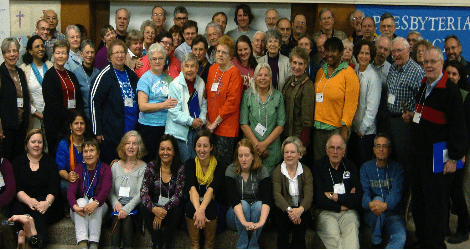As the Presbyterian Church (U.S.A.) begins a process of discernment on whether to embrace nonviolence officially, the Presbyterian Peace Fellowship convenes peacemakers from across the church.
by Matthew BlackWe Presbyterians know all about miracles—
they happen in committees.
This particular miracle begins a few years ago, when some dreamers in the Presbyterian Peace Fellowship (PPF) began imagining what it might be like for the Presbyterian Church to really discuss the issue of war theologically. Warfare has drastically changed in this century, and Just War theory—the concept that war can be justified if it meets the right criteria—seems less and less helpful in determining how Christians should faithfully respond to violence in modern times. “What if,” these dreamers thought, “rather than yelling at each other every time our denomination wrestles with taking positions on particular wars, we instead took the time as a church to really think about this, talk about this with each other, and discern God’s voice?”
Those dreamers shot for the moon: an overture to the General Assembly asking all of us to consider moving away from Just War Theory and embracing nonviolence. They thought it was just a dream. In a denomination that has for generations operated under Just War theory, passing an overture considering becoming a peace church probably would take a miracle. “It will never pass, but at least the church might talk about it.”
But it did pass.
At the 219th General Assembly in 2010, a miracle occurred. The overture was actually strengthened by its committee, and the General Assembly voted to undertake a six-year discernment process to “seek clarity as to God’s call to the church to embrace nonviolence as its fundamental response to the challenges of violence, terror, and war.”
But there is a lot of work ahead. If the PC(USA) is going to step into the call of this action of the General Assembly and the possibilities it presents, it is going to take a real grassroots movement. That’s where the PPF comes in.
On April 26-29, we’re hosting a gathering of peacemakers from across the church to take up this task. What might the PC(USA) look like as a peace church? How can we help this conversation happen? This “Convocation of Peacemakers” is a working meeting to pool our gifts, dream big together, and take real action for a more peaceful world. Experts and seasoned activists will work alongside rookies and people who aren’t sure they identify as “peacemakers” or “activists.” You’re invited to be part of this (and scholarships are available)—come ready to work.
This “peace church” conversation is only part of the package. The PPF—a small organization composed almost entirely of volunteers—actively works on some of the most critical issues of our time, and we’ll be continuing to plan next steps at this event on these issues:
- accompaniment and advocacy with our partners in Colombia,
- seeking a just peace in Israel/Palestine,
- working against racism, and
- organizing to prevent gun violence—particularly illegal gun trafficking—in the U.S.
It is an exciting time. For every heartbreaking news story we hear, there are many small groups of committed citizens, thoughtful activists, and people of faith working together to be the bearers of small miracles. The most amazing things happen when the people of God gather to work together.
Hope to see you in April.
Learn more and register for the 2012 Convocation of Peacemakers here.
__________________________
 Matthew Black serves as Website Development Manager for the Presbyterian Peace Fellowship and the Council for a Parliament of the World’s Religions. He is also a singer/songwriter, worship leader, alumnus of the PC(USA)’s Young Adult Volunteer Program, and graduate of McCormick Theological Seminary. He lives in an intentional community in Chicago.
Matthew Black serves as Website Development Manager for the Presbyterian Peace Fellowship and the Council for a Parliament of the World’s Religions. He is also a singer/songwriter, worship leader, alumnus of the PC(USA)’s Young Adult Volunteer Program, and graduate of McCormick Theological Seminary. He lives in an intentional community in Chicago.










The people of the State of Israel are genetically Europeans for the most part. Their Semitic beginnings were long diluted by intermarriage during the two millennia they have been wandering. In fact, as a diaspora in the first century of the common era, with colonies along the Mediterranean, the Middle East, and into the upper NIle and South India, they were no longer ethnically Semites. Their commonality is in a religious culture.
Their claim to the land is without merit. From the Balfour declaration the claim has wings due to antisemitism, a prejudice against Jews.
The people who are Arab and Christian in Palestine are the genetic descendants of the Jews who once lived in Palestine. Ironically, the repression and oppression of Palestinians is the only real anti-semitism.
This confounds the popular understanding of
Much as I find things to admire in the witness of Mennonites and other peace churches, I doubt that becoming a pacifist denomination reflects who Presbyterians are. Black admits as much when he calls the fact their proposal got through G.A. a “miracle.” But far worse is the way leaving Just War theory behind would mean losing touch with a rich tradition of theological and moral discernment that should continue to guide us in the face of violence and injustice.
Black asserts that the Just War Tradition is no longer helpful. One can only wonder how or why he makes this claim. As I reflect on our recent wars, it seems to me that a firmer grip on the traditional criteria would be exceedingly helpful. Perhaps we would have noticed that the idea of “preventative war” was a novel justification for the War in Iraq, never part of the tradition and quite different from the idea of “preemptive attack.” And wouldn’t traditional Jus in bellum criteria help us as we have a better conversation about torture and drones?
This is what they want us to leave behind!
Pacifism, like all extreme positions, provides the comfort of simplistic clarity. But at a cost. In a perverse way, leaving behind the Just War Tradition would mean joining the “war is hell” crowd, for whom moral distinctions concerning the use of force are otoise. In this way pacifism cloaks the abdication of moral responsibility with false righteousness.
Appreciated both Matt’s invitation piece and Ray’s look at the Peace Fellowship approach with critical eye. This is the kind of exchange we hope for in many churches in the two years ahead. What I would add to Matt’s piece is that the other overtures including a comprehensive one from Pittsburgh that identified the range of policy and program that needed updating, and the suggestion in a number of overtures that we seek “new thinking” by involving the PCUSA-related colleges and universities more. That updating work will involve looking at the use of the Just War criteria, including the analysis in Christian Obedience in a Nuclear Age which suggested that some criteria rule out the use of nuclear weapons.